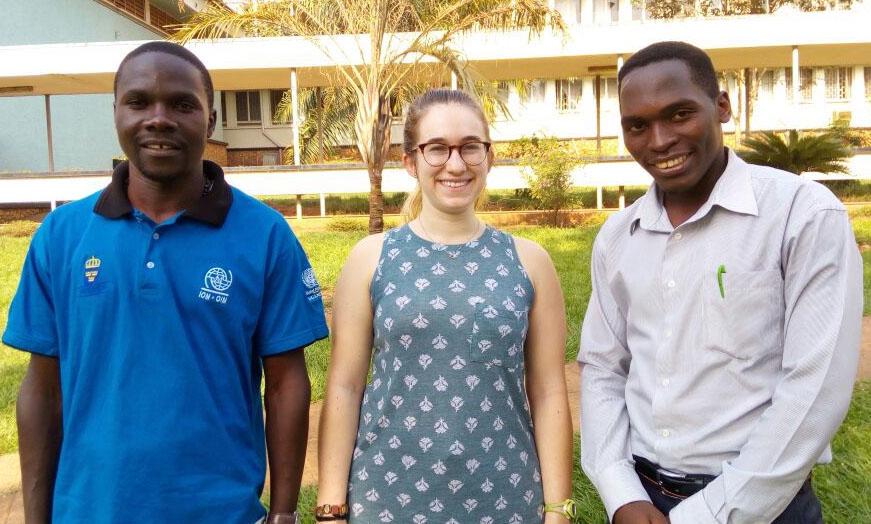Developing the next generation of global health researchers
What are the reasons for gaps and failures in the successful prevention of cryptococcal meningitis in certain patients? What is the effect of multi-drug resistant tuberculosis (MDR TB) and its treatment on lung function?
These are some of the questions that teams of student researchers will be tackling over the coming months as part of their involvement in the Uganda Research Training Collaborative (URTC). This program pilot was launched in December by CGHSR with the goal of developing the next generation of global health researchers. A matching process, based on research interest, placed students from the University of Minnesota and Makerere University onto teams and provided mentors from each institution. Together, the teams will develop a proposal, create a research plan, gather at their study site in Uganda to conduct research, and write manuscripts for publication. Strong mentorship is the cornerstone of the program, with teams benefiting from the vast experience of their seasoned faculty mentors. Teams will also participate in workshops and be connected to resources that advance the knowledge and skills necessary to conduct international research. After research preparation throughout the spring, it is anticipated that teams will carry out their data collection in summer and then complete data analysis and disseminate findings in the fall of 2017.
Joshua Rhein, Assistant Professor, Infectious Diseases and International Medicine, U of M Medical School, will guide the program under his new role as Research and Training Director of the AHC Uganda Hub. Dr. Rhein is well positioned to develop this new program as he splits his time between Uganda and Minnesota. He also has first-hand experience, as a medical student and research fellow, of the value of outstanding mentorship at the University of Minnesota and Makerere University. This effort builds on an already strong collaborative relationship between the Academic Health Center (AHC) and Makerere University, and aims to cultivate a culture of excellence in global health research.
Research Teams
Team 1
A study to determine the prevalence of Mycobacterium Bovis in slaughtered cattle in the city abbatoirs of Kampala, Uganda
Students
- Patrick Albert, Makerere University, College of Veterinary Medicine, Animal Resources and Bio-security (CoVAB)
- Anna Munsey, University of Minnesota, College of Veterinary Medicine
- Sophia Namuddu, Makerere University, College of Veterinary Medicine, Animal Resources and Bio-security (CoVAB)
- James Watuwa, Makerere University, College of Veterinary Medicine, Animal Resources and Bio-security (CoVAB)
Mentors
- Clovice Kankya, Makerere University, College of Veterinary Medicine, Animal Resources and Bio-security (CoVAB)
- Lawrence Mugisha, Makerere University, College of Veterinary Medicine, Animal Resources and Bio-security (CoVAB)
- Margaret Saimo-Kahwa, Makerere University, College of Veterinary Medicine, Animal Resources and Bio-security (CoVAB)
- Kimberly VanderWaal, University of Minnesota, College of Veterinary Medicine
Team 2
Lung function and quality of life in survivors of drug-resistant tuberculosis
Students
- Joseph Baluku, Makerere University, School of Medicine
- Mathias Lubega, Makerere University, School of Medicine
- Edwin Nuwagira, Mbarara University of Science and Technology, School of Medicine
- Anna Stadelman, University of Minnesota, School of Public Health
Mentors
- Pauline Byakika-Kibwika, Makerere University, School of Medicine
- Ken Kunisaki, University of Minnesota, Medical School
- Harriet Mayanja Kizza, Makerere University, School of Medicine
- Joshua Rhein, University of Minnesota, Medical School
Team 3
Evaluating the first year of the routine CRAG screening program in the reduction of HIV-associated cryptococcal meningitis in Uganda
Students
- Bridget Griffith, University of Minnesota, School of Public Health
- Enock Kagimu, Makerere University, School of Medicine
- Julius Kiwanuka, Makerere University, School of Public Health
Mentors
- Nicole Basta, University of Minnesota, School of Public Health
- David Meya, Makerere University, School of Medicine
- Aggrey Semeere, Makerere University, School of Medicine
Team 4
Effect of adherence and malnutrition on pharmacokinetics and virologic outcomes of atazanavir in HIV-infected adolescents
Students
- Dave Darshit Ashok, Makerere University, School of Biomedical Sciences
- Nana Jacqueline Nakiddu, Makerere University, School of Medicine
- Aine Provia, Makerere University, School of Health Sciences
- Erin Sodawasser, University of Minnesota, School of Public Health
Mentors
- Sabrina Bakeera-Kitaka, Makerere University, School of Medicine
- Melanie Nicol, University of Minnesota, College of Pharmacy
- Bob Opoka, Makerere University, School of Medicine
- Christine Sekaggya-Wiltshire, Makerere University, College of Health Sciences
Key Collaborators and Training Contributors
CGHSR extends a special thank you to these key partners who helped make the URTC possible.
- Nicole Basta, University of Minnesota, School of Public Health
- Courtney Jarboe, University of Minnesota, Human Research Protection Program
- Stephen Okoboi, Makerere University, Infectious Diseases Institute
- John Ssenkusu, University of Minnesota, School of Public Health, Biostatistics
Joshua Rhein Biography
Dr. Josh Rhein began his career in global health as a medical student, where he took a flex-year to help establish the first collaborative research projects between the University of Minnesota and the Infectious Diseases Institute (IDI) in Kampala, Uganda. After completing his residency, Dr. Rhein was delighted to return to Minnesota for his Infectious Diseases Fellowship, where he found that the Uganda collaboration had grown considerably under the leadership of Drs. Paul Bohjanen, David Boulware, David Meya, and Andrew Kambugu. He spent the majority of his fellowship based in Uganda, where he continued his research on cryptococcal meningitis and immune reconstitution inflammatory syndrome. Upon joining the faculty in the Department of Medicine at the University of Minnesota, Dr. Rhein continued his work in Uganda as the AHC Hub was developing, and is now the Research and Training Director of the Hub. He enjoys providing mentorship for Ugandan and American students alike, and is a needed resource for the URTC. His passion and personal research remain focused on providing the best possible care for patients with HIV and cryptococcal meningitis. He currently divides his time between Minneapolis and Uganda.
Research Training Collaborative
The RTC provides hands-on experience in global health research under the mentorship of UMN and faculty members from partner institutions.

